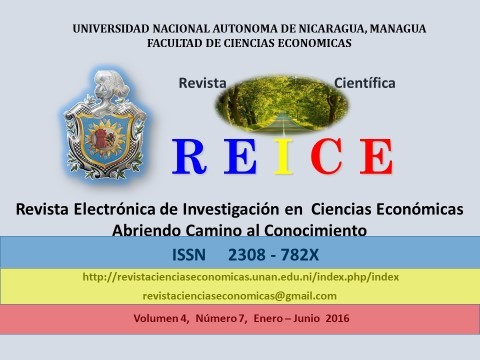Cotton and environmental externalities in Nicaragua
DOI:
https://doi.org/10.5377/reice.v4i7.2819Keywords:
Cotton, externalities, environmental impact, Coase Theorem, NicaraguaAbstract
This paper presents partial results of the research "Externalities, environmental and economic policy in Nicaragua". Part of the issue referred to cotton was presented at the II International Colloquium Doctoral and Postdoctoral Geopolitics, Society, New Economy and Management (Caracas, 2012) and during the II International Seminar History, Culture and Environment (Managua, 2013). The research is part of the Doctoral Program in Economics, of the Faculty of Economics and Social Science University of Zulia (Venezuela), and allowed to determine the possible relationship between the market´s externalities associated to the four major export historical items of Nicaragua, their impacts on the environment and potential risks for the emerging economic activities. The results revealed that the agro-export model has not only generated great negative externalities but also it has been strengthened by severe environmental impacts that led to the collapse of the own cotton item.Downloads
1465
Downloads
Published
How to Cite
Issue
Section
License
Copyright (c) Revista Electronica de Investigacion en Ciencias Economicas
The rights to the articles published in REICE are from the journal, in order to be able to manage their best dissemination. However, since the purpose of the same is the dissemination of knowledge, this journal provides immediate free access to its content, under the principle that making research available to the public free of charge, which fosters a greater exchange of global knowledge.
The opinions expressed by the authors do not necessarily reflect the position of the publisher of the publication or of the UNAN-Managua. Its reproduction and distribution is authorized (in any type of support) provided that the following indications are fulfilled:
- The authorship of the work
- Indicate its origin (REICE magazine, volume, number and electronic address of the document)

